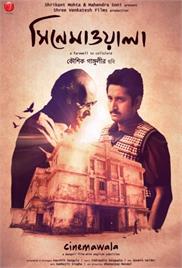Be Careful of Fake Websites. Always use HindiMovies.to domain & Join our Telegram Channel for Latest Updates.

Likes: 1
Views: 2.25K
Pranabendu Das is a retired film exhibitor from a small-town in West Bengal. He owns a movie theatre ‘Kamalini’ named after his separated wife. With the advancement of technology and the arrival of the digital medium, this man was compelled to let go of his theatre which projected films only on celluloid. Prakash is unperturbed by his father, Pranab’s condition. He is an opportunist, who would never give morality a chance while making himself an established businessman. He sells pirated DVDs of feature films in the town. This is a father-son relationship tale weaved through the beautiful backdrop of cinema. Pranab has always maintained himself as a true Cinemawala, whereas, Prakash is also spreading films among the people, but in a way not so acceptable to his father.
Duration: 105 min
Released: 2016
IMDb Rating: 7.5/10 (321 Votes)
Genre: Drama
Stars: Parambrata Chatterjee, Paran Banerjee, Arun Guhatharkurta, Sohini Sarkar
Directors: Kaushik Ganguly
Writers: Writer: Kaushik Ganguly
Year: 2016
Title: Cinemawala (2016)
Genre: Drama
Director: Kaushik Ganguly
Writer: Kaushik Ganguly
Main Cast: Parambrata Chattopadhyay, Paran Banerjee
Overview:
Cinemawala is a poignant 2016 Bengali drama directed and written by the acclaimed filmmaker Kaushik Ganguly. Known for his nuanced storytelling and exploration of complex human emotions, Ganguly crafts a heartfelt narrative that delves into the impact of technological change on traditional livelihoods and familial bonds. The film centers on the story of an aging father and his son, exploring the emotional and cultural chasms that open between them as they confront the inevitable decline of their business in the digital age.
Plot Summary:
The story unfolds the life of Pranabendu Mukherjee, portrayed with great depth by Paran Banerjee, an elderly man who runs a single-screen cinema hall in Kolkata, India. His theater is a relic of the past, still projecting films on celluloid reels, a dying art in the face of the modern multiplex culture and rampant digital piracy that has significantly diminished the charm and business of such legacy establishments.
Pranabendu’s son, Prakash, played by Parambrata Chattopadhyay, is modern, practical, and somewhat pragmatic, representing the new generation that is keenly aware of the economic realities. He urges his father to adapt to the changing times, which eventually leads to tension between the two. While Pranabendu is deeply sentimental about films and the projection booth, his son sees the cinema as a business that must evolve or perish.
The narrative beautifully captures the emotional turmoil and disconnect between the father and son as they navigate their pain over the dying tradition of film projection and the threats posed by piracy and technological advancements. The movie is a touching commentary on the importance of preserving cultural heritage while also embracing change. It highlights the bitter-sweet sentiments involved in letting go of a cherished past, all woven through the metaphor of the disappearing celluloid cinema experience.
Performances:
Parambrata Chattopadhyay delivers a compelling and heartfelt performance as Prakash. His portrayal is both tender and conflicted, embodying the struggles of a son caught between affection for his father and a pragmatic approach toward survival in a changing economy. Paran Banerjee as Pranabendu gives a masterful performance, bringing warmth and vulnerability to the role of an old-time cinema owner whose passion for films is unwavering even as his world crumbles around him.
Direction and Writing:
Kaushik Ganguly stands out as both the director and writer of Seminalwala. His vision and storytelling finesse breathe life into what could have been a simple family drama. Instead, the film blossoms into a rich, multi-layered narrative that speaks about cinema as a cultural institution and the human cost of modernization. Ganguly’s sensitive treatment avoids melodrama and instead opts for realism, introspection, and emotional depth, making the film both relatable and thought-provoking.
Music and Songs:
As Cinemawala is a Bengali drama focused on realism and familial relationships, the film's emphasis lies more in its storytelling and atmosphere rather than song and dance sequences typically seen in Bollywood productions. The background score subtly accentuates the mood, underlining the emotional undercurrents without distracting from them. The film does not feature typical Bollywood-style songs but relies on an evocative soundtrack to complement its contemplative tone.
Themes:
Critical Reception:
Cinemawala was widely praised by critics for its subtle storytelling, strong performances, and the sensitive handling of its poignant subject matter. Critics lauded the film's ability to address the pain of cultural loss without resorting to clichés or heavy-handed messages. It resonated especially well with audiences familiar with the decline of single-screen theaters in India, realizing the emotional and social costs of rapid modernization.
Conclusion:
Cinemawala is a thoughtful and touching film that honors the dying legacy of celluloid cinema and the human stories intertwined with it. Through the relationship of Pranabendu and Prakash, the film eloquently captures the inevitable tensions between the past and the present. It stands as a tribute to the simple joys of watching a movie in a small cinema hall and reminds us of the personal and cultural histories that are often lost in the march of progress. For anyone interested in cinema’s evolving landscape and family dramas layered with emotional nuance, Cinemawala offers a deeply rewarding cinematic experience.